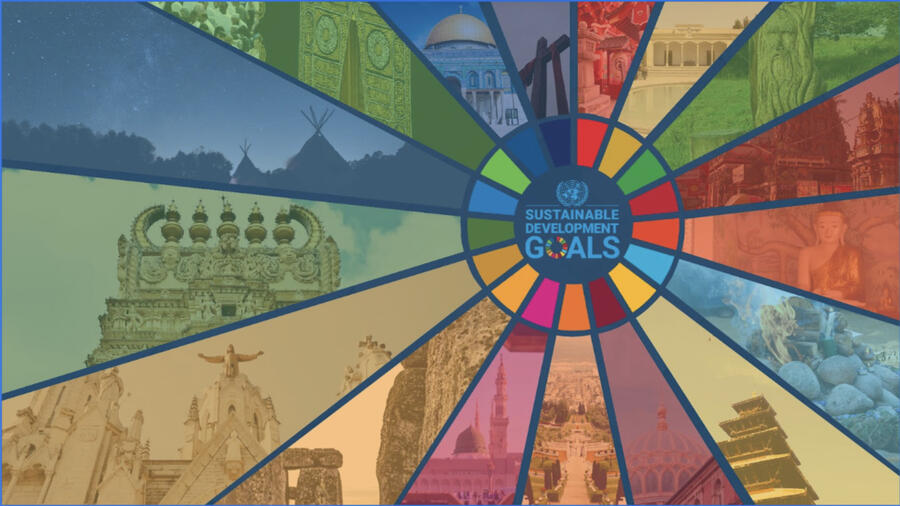
On 22 May, a periodic supplement was released to highlight new and ongoing efforts within our online Faith Action database through the lens of SDG 15: Life on Land. This issue, titled Faith Action on the UN Sustainable Development Goals: Life on Land, highlights a sampling of organized efforts that protect, restore and promote sustainable use of terrestrial ecosystems; sustainably manage forests; combat desertification; reduce and reverse land degradation; and halt biodiversity loss from a uniquely faith-driven lens.
This report’s topical focus - SDG 15: Life on Land - complements the International Day of Biological Diversity which is observed annually on May 22. This year, this observance also occurs during Laudato Si’ Week (May 21-28) which celebrates the eighth anniversary of Pope Francis' landmark encyclical on care for creation.
The convergence of this thematic report with promotion of biodiversity issues can be illustrated with the below quotes from Laudato Si’. We encourage you to read this newly-released Faith Action on SDG 15 report for detailed descriptions of these projects’ activities, for curated lists of educational and practical resources, and for helpful ideas for your own personal and professional efforts to care for the earth community.
PROJECT 1:
Xingu Seeds Network (Instituto Socioambiental, Brazil, Indigenous)
“…it is essential to show special care for [I]ndigenous communities and their cultural traditions. They are not merely one minority among others, but should be the principal dialogue partners” (sec. 146)
PROJECT 2:
Free Farm Stand / Produce Donation (Urban Adamah, USA, Judaism)
“…it is imperative to promote an economy which favours productive diversity and business creativity. For example, there is a great variety of small-scale food production systems which feed the greater part of the world’s peoples, using a modest amount of land and producing less waste, be it in small agricultural parcels, in orchards and gardens, hunting and wild harvesting or local fishing.” (sec. 129)
PROJECT 3:
Church Forests (Ethiopian Orthodox Churches, Ethiopia, Christianity)
“Patriarch Bartholomew has spoken in particular of the need for each of us to repent of the ways we have harmed the planet, for ‘inasmuch as we all generate small ecological damage’, we are called to acknowledge ‘our contribution, smaller or greater, to the disfigurement and destruction of creation’. He has repeatedly stated this firmly and persuasively, challenging us to acknowledge our sins against creation: ‘For human beings… to destroy the biological diversity of God’s creation; for human beings to degrade the integrity of the earth by causing changes in its climate, by stripping the earth of its natural forests or destroying its wetlands; for human beings to contaminate the earth’s waters, its land, its air, and its life – these are sins’. For ‘to commit a crime against the natural world is a sin against ourselves and a sin against God’.” (sec. 8)
PROJECT 4:
Climate Champions (Islamic Relief, Indonesia, Islam)
“In some countries, there are positive examples of environmental improvement: rivers, polluted for decades, have been cleaned up; native woodlands have been restored; landscapes have been beautified thanks to environmental renewal projects; beautiful buildings have been erected; advances have been made in the production of non-polluting energy and in the improvement of public transportation. These achievements do not solve global problems, but they do show that men and women are still capable of intervening positively. For all our limitations, gestures of generosity, solidarity and care cannot but well up within us, since we were made for love.” (sec. 58)
PROJECT 5:
Snow Leopard Habitat Protection (Tibetan Monasteries, China, Buddhism)
“It is not enough, however, to think of different species merely as potential ‘resources’ to be exploited, while overlooking the fact that they have value in themselves. Each year sees the disappearance of thousands of plant and animal species which we will never know, which our children will never see, because they have been lost for ever. The great majority become extinct for reasons related to human activity. Because of us, thousands of species will no longer give glory to God by their very existence, nor convey their message to us. We have no such right.” (sec. 33)
“Francis helps us to see that an integral ecology calls for openness to categories which transcend the language of mathematics and biology, and take us to the heart of what it is to be human. Just as happens when we fall in love with someone, whenever he would gaze at the sun, the moon or the smallest of animals, he burst into song, drawing all other creatures into his praise. He communed with all creation, even preaching to the flowers, inviting them ‘to praise the Lord, just as if they were endowed with reason’. His response to the world around him was so much more than intellectual appreciation or economic calculus, for to him each and every creature was a sister united to him by bonds of affection. That is why he felt called to care for all that exists.” (sec. 11)
PROJECT 6:
Project Greenhands (Isha Foundation, India, Hindu)
“The notion of the common good also extends to future generations. The global economic crises have made painfully obvious the detrimental effects of disregarding our common destiny, which cannot exclude those who come after us. We can no longer speak of sustainable development apart from intergenerational solidarity. Once we start to think about the kind of world we are leaving to future generations, we look at things differently; we realize that the world is a gift which we have freely received and must share with others.” (sec. 159)
